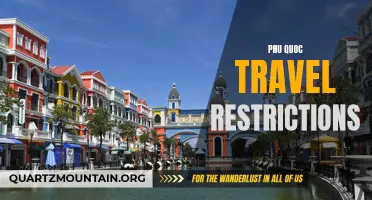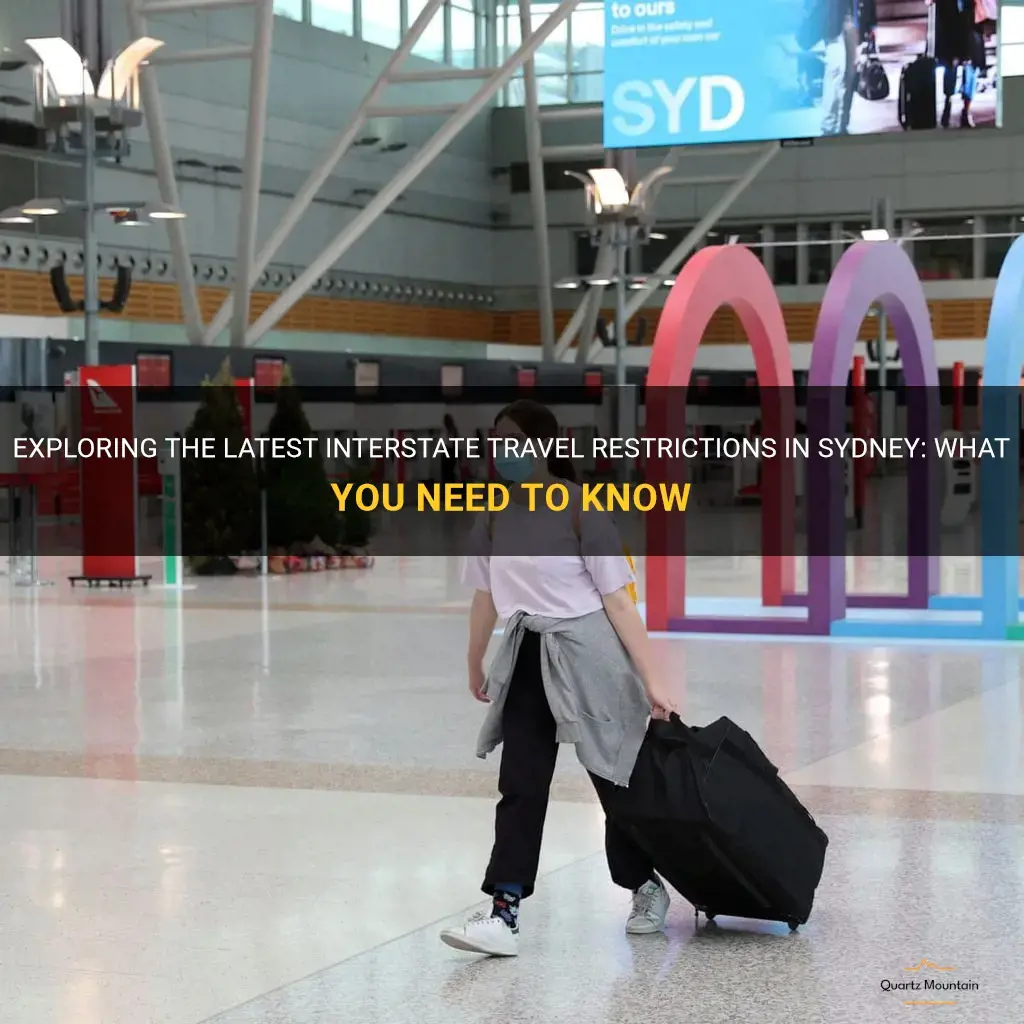
Sydney, the bustling city in Australia, known for its iconic landmarks, vibrant culture, and delicious cuisine, has been grappling with the challenges posed by interstate travel restrictions. As the COVID-19 pandemic continues to wreak havoc globally, Sydney, like many other cities, has implemented measures to prevent the spread of the virus. These restrictions on interstate travel have not only impacted tourism but have also raised important questions about the balance between public health and the economy. In this article, we will explore the implications of these restrictions on Sydney and how they have shaped the city's landscape.
What You'll Learn
- What are the current interstate travel restrictions for Sydney residents?
- Are there any specific requirements or documentation needed for interstate travel from Sydney?
- Are there any states or territories that have closed their borders to Sydney residents?
- Are there any exemptions or special circumstances for interstate travel from Sydney?
- What are the penalties for violating interstate travel restrictions from Sydney?

What are the current interstate travel restrictions for Sydney residents?
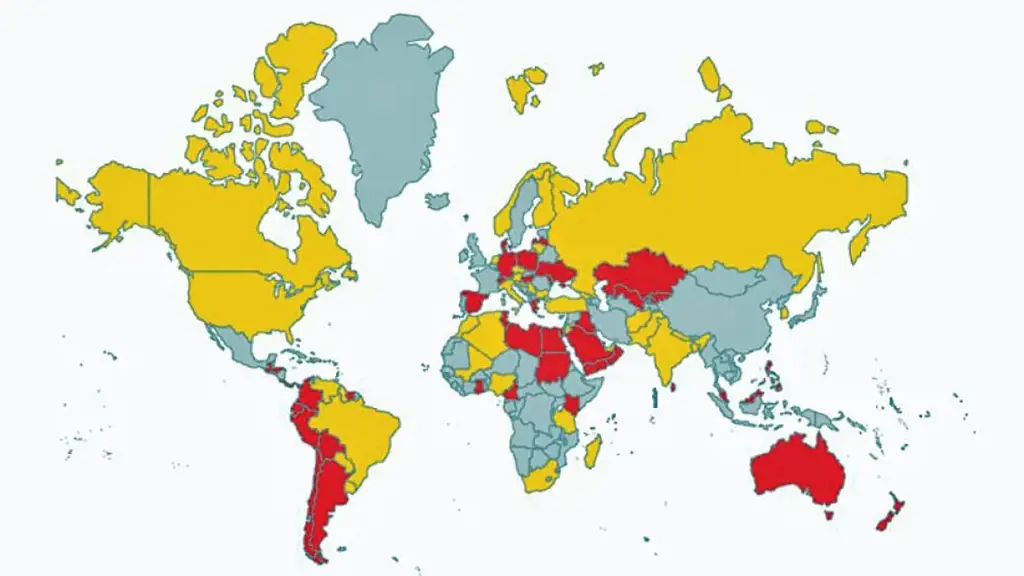
Sydney residents have faced numerous travel restrictions due to the ongoing COVID-19 pandemic. These restrictions have made it difficult for individuals in the city to travel interstate. However, it is essential to note that the restrictions are subject to change based on the current situation and government guidelines. Here is an overview of the current interstate travel restrictions for Sydney residents.
New South Wales (NSW) has implemented strict measures to prevent the spread of the virus, including travel restrictions. As of now, Sydney residents can travel to other states, but they may face certain requirements or restrictions depending on the destination.
Victoria, for instance, has imposed restrictions on travelers from Sydney due to recent outbreaks. Anyone entering Victoria from the Greater Sydney area must apply for a permit through the Victorian Department of Health before arrival. The permit may be granted based on various factors such as vaccination status, exposure sites, and travel history. It is essential to check the latest requirements and apply for a permit before planning a trip to Victoria.
Queensland also has specific requirements for Sydney residents traveling to their state. As of now, if you have been in the Greater Sydney region in the past 14 days, you will need to apply for a Queensland Border Declaration Pass before entering the state. The requirements for the pass may vary depending on the COVID-19 situation in Sydney, and it is crucial to check for updates regularly.
South Australia, Western Australia, Tasmania, and other states may have their own set of requirements for Sydney residents. It is advisable to check the official websites of these states or contact their respective health departments for the most up-to-date information on travel restrictions.
In addition to the interstate travel restrictions, Sydney residents may also face quarantine requirements upon arrival in certain states. For example, some states may require individuals from Sydney to undergo mandatory hotel quarantine for a specific period upon entry. The quarantine period may vary depending on the current COVID-19 situation.
It is essential to stay informed about the latest travel restrictions and guidelines before planning any interstate travel from Sydney. The COVID-19 situation is continually evolving, and restrictions can change rapidly. It is advisable to check the official government websites and consult with relevant authorities to ensure compliance with the current regulations. Remember to adhere to all health and safety measures, including wearing masks, practicing social distancing, and getting vaccinated to protect yourself and others during your travel.
Clearwater Beach Florida Travel Restrictions: What You Need to Know
You may want to see also

Are there any specific requirements or documentation needed for interstate travel from Sydney?
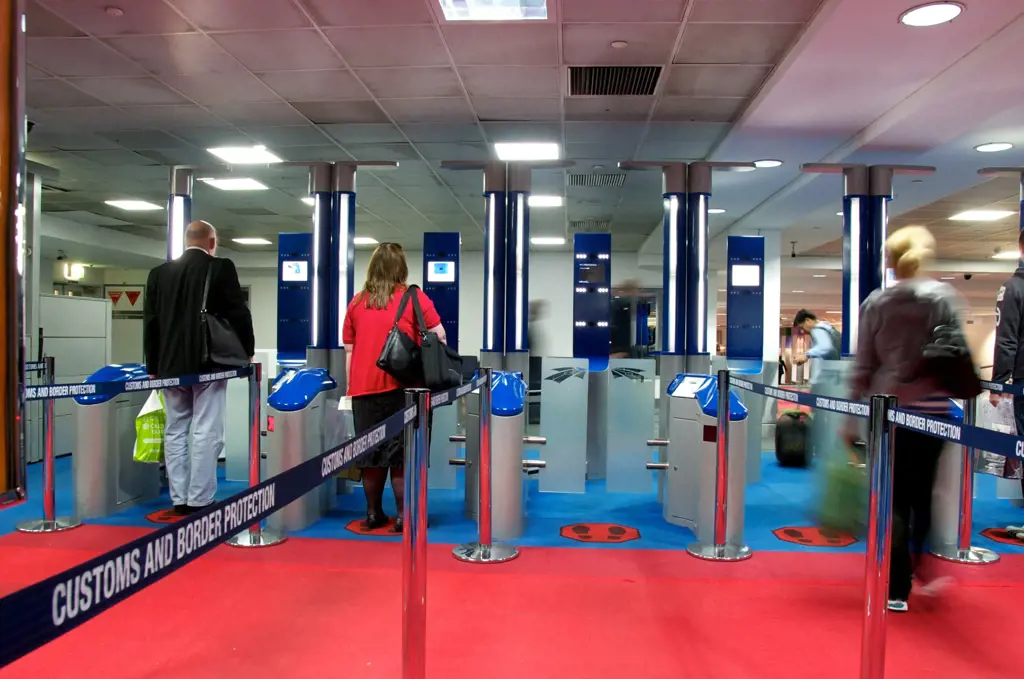
If you are planning to travel interstate from Sydney, it is important to be aware of any specific requirements or documentation needed for your journey. While requirements may vary depending on your destination, here are some general guidelines to keep in mind.
- Check the Travel Restrictions: Before planning your trip, it is essential to check the travel restrictions imposed by your destination state or territory. These restrictions can change over time, so make sure to stay updated with the latest information. You can visit the official government websites or contact the relevant authorities to get the most accurate and up-to-date information.
- Proof of Identity: When traveling interstate, you will need to carry a valid form of identification. This can be your passport or an Australian driver's license. Make sure that your identification documents are not expired and are in good condition.
- COVID-19 Vaccination and Testing: Due to the ongoing COVID-19 pandemic, different states and territories may have varying requirements regarding vaccination and testing. Some regions may require proof of COVID-19 vaccination or a negative test result taken within a specific timeframe before the travel. Check the requirements of your destination regarding COVID-19 vaccinations and testing before you travel.
- Border Entry Declarations: Some states or territories may require travelers to complete online border entry declarations or forms before their arrival. These forms typically ask questions about your recent travel history, health conditions, and contact details. Make sure to complete these declarations accurately and submit them before your journey.
- Quarantine Measures: Quarantine requirements may vary depending on the state or territory you are traveling to. Some destinations may require you to undergo mandatory quarantine upon arrival, while others may have exemptions or shorter quarantine periods for fully vaccinated individuals. It is essential to familiarize yourself with the specific quarantine measures in place at your destination.
- Electronic Travel Authorization: Certain states or territories may require travelers to obtain an electronic travel authorization or permit before their arrival. These authorizations can be obtained online and may have a processing fee associated with them. Make sure to check if your destination requires any travel authorization and apply for it before your journey.
- Essential Travel Only: During certain periods or if there are lockdowns or restrictions in place, some states or territories may only allow essential travel. It is important to check if your trip falls under the category of essential travel as defined by the respective authorities. Non-essential travel may be restricted or subject to additional requirements.
- Transport and Accommodation: It is advisable to book your transport and accommodation in advance as the availability may be limited due to capacity restrictions or other factors. Check with the transport providers and accommodation providers for any specific requirements or guidelines you need to follow.
Remember that these requirements and guidelines can change over time, so it is crucial to stay informed and regularly check for updates before your travel. Always follow the instructions and guidelines provided by the relevant authorities to ensure a smooth and hassle-free journey.
Understanding Travel Restrictions from Canada to London in 2022
You may want to see also

Are there any states or territories that have closed their borders to Sydney residents?
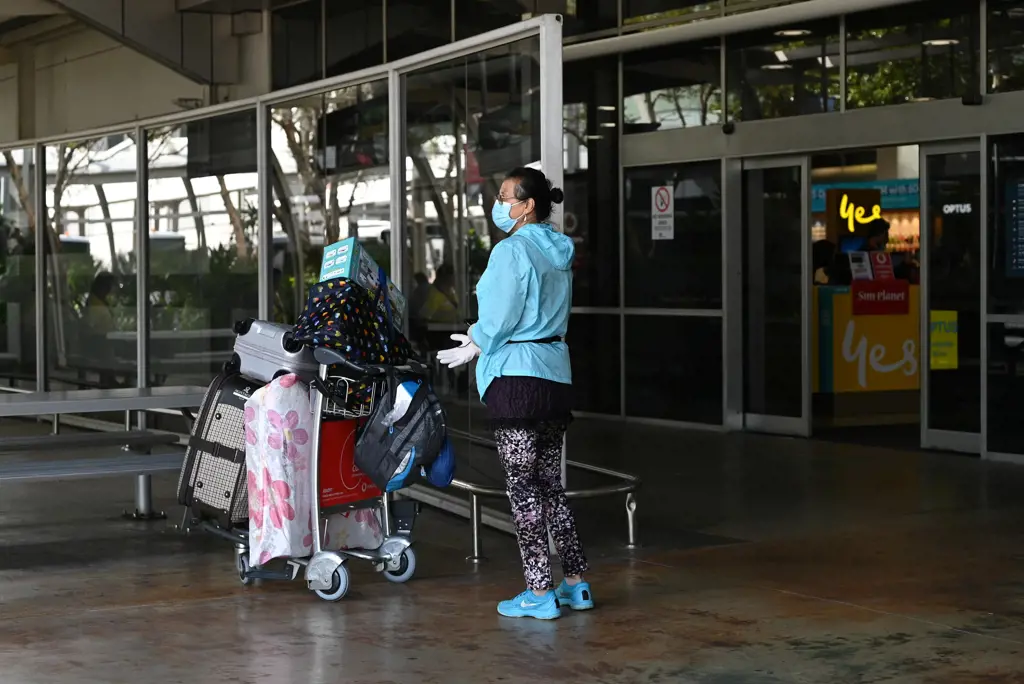
In response to the recent COVID-19 outbreak in Sydney, several states and territories in Australia have implemented border closures or travel restrictions for residents of the Greater Sydney area. These measures are aimed at preventing the spread of the virus to other parts of the country.
As of now, the following states and territories have closed their borders or imposed travel restrictions for Sydney residents:
- Queensland: The Queensland government has declared the Greater Sydney area a COVID-19 hotspot. This means that residents of the affected areas are not allowed to enter Queensland unless they have a valid exemption. Any residents of Greater Sydney who wish to enter Queensland must apply for a border pass and may be required to quarantine for 14 days upon arrival.
- Northern Territory: The Northern Territory has declared Greater Sydney, as well as the Central Coast and Wollongong regions, as COVID-19 hotspots. Anyone who has been in these areas in the past 14 days is not permitted to enter the Northern Territory without a valid exemption. Those who are granted an exemption may still be required to undergo 14 days of supervised quarantine.
- South Australia: South Australia has imposed a hard border closure for all residents of Greater Sydney. This means that people from the affected areas are not allowed to enter South Australia, unless they are an essential traveler or have a valid exemption. There are limited exemptions available, such as for essential workers or people relocating permanently to South Australia.
- Western Australia: Western Australia has implemented a hard border closure for residents of the Greater Sydney area. This means that anyone who has been in Sydney in the past 14 days is not permitted to enter Western Australia, unless they have an exemption. Exemptions are available for essential workers, people relocating to Western Australia, and those with compassionate grounds.
It is important to note that these restrictions are subject to change and may be updated as the situation evolves. The health authorities in each state and territory are closely monitoring the situation in Sydney and will adjust their border measures accordingly.
If you are planning to travel to any of these states or territories from Sydney, it is crucial to stay updated on the latest travel advice and restrictions. It is also advisable to check the requirements for entry, including any necessary border passes or exemptions.
In addition to border closures, it is essential for everyone to continue practicing good hygiene, wearing masks where required, and following social distancing guidelines to help minimize the spread of COVID-19. By taking these precautions, we can all contribute to keeping our communities safe and healthy.
Ohio's Current Travel Restrictions: What You Need to Know
You may want to see also

Are there any exemptions or special circumstances for interstate travel from Sydney?
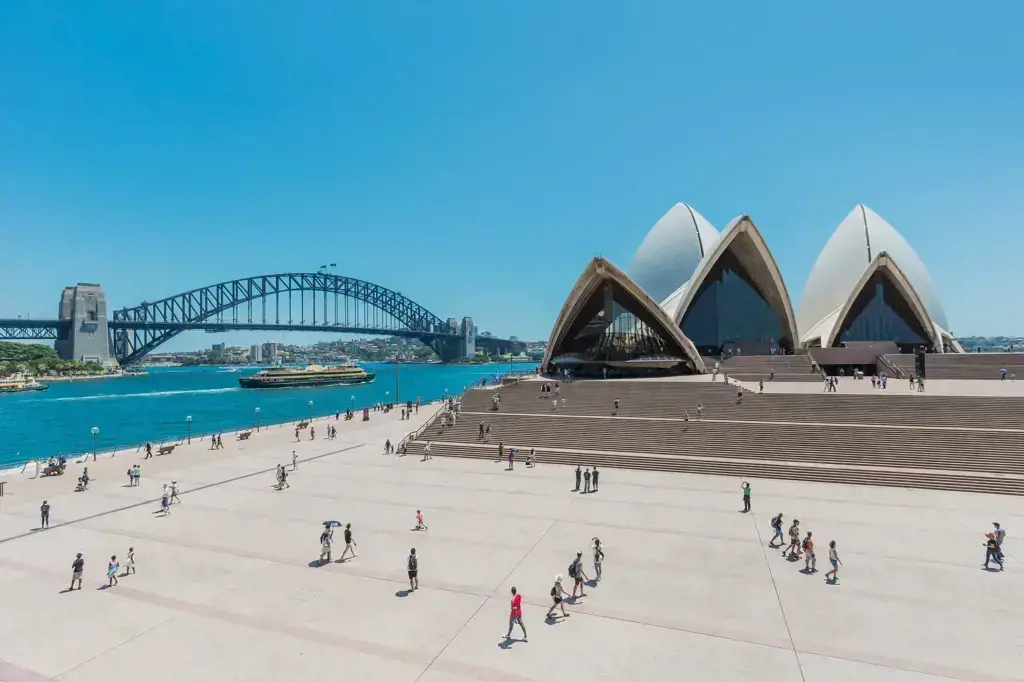
Since the outbreak of the COVID-19 pandemic, many countries and regions have implemented travel restrictions in order to prevent the spread of the virus. Australia is no exception, and various measures have been put in place to regulate interstate travel. Sydney, as one of the major cities in Australia, has also been subject to these restrictions.
However, there are certain exemptions and special circumstances that may allow individuals to travel interstate from Sydney. It is important to note that these exemptions are subject to change and it is essential to stay updated on the latest information and guidelines provided by the relevant authorities.
Here are some common exemptions and special circumstances for interstate travel from Sydney:
- Essential workers: Individuals who are classified as essential workers may be exempted from travel restrictions. Essential workers typically include healthcare workers, emergency service providers, and individuals involved in the transportation of goods and essential services.
- Compassionate reasons: Travel for compassionate reasons, such as to provide care or support to a sick family member or attend a funeral, may be allowed even under travel restrictions. However, it is advisable to inform the relevant authorities and obtain any necessary approvals or permits before traveling.
- Endorsed by state or territory authorities: In certain cases, individuals may be allowed to travel interstate if they have received an endorsement or approval from the state or territory authorities. This may require providing supporting documentation or evidence to justify the need for travel.
- Other exceptional circumstances: There may be other exceptional circumstances under which interstate travel may be permitted. These circumstances could include medical emergencies, legal obligations, or situations that pose a significant risk to the individual's safety or wellbeing.
It is important to emphasize that anyone intending to travel interstate from Sydney, under any of the exemptions or special circumstances mentioned above, should always abide by the public health guidelines and follow the necessary protocols to minimize the risk of spreading the virus. This may include practicing good hygiene, wearing masks, and maintaining social distancing.
Additionally, individuals should be prepared for the possibility of having to undergo testing or quarantine upon arrival at their destination. The specific requirements may vary depending on the state or territory being traveled to and the prevailing public health situation.
To stay informed and up to date on the latest information regarding exemptions and special circumstances for interstate travel, it is recommended to regularly check the websites of the relevant state or territory government departments, as well as the official sources of health information. It is also advisable to consult with a healthcare professional or travel advisor for specific guidance tailored to individual circumstances.
In summary, while there are exemptions and special circumstances that may permit interstate travel from Sydney, it is crucial to carefully consider the risks and follow the necessary precautions to ensure the safety of oneself and others. Stay informed, adhere to the guidelines, and prioritize the wellbeing of the community when planning any travel during these unprecedented times.
Hungary Sets Stricter Travel Restrictions Amidst Rise in COVID Cases
You may want to see also

What are the penalties for violating interstate travel restrictions from Sydney?
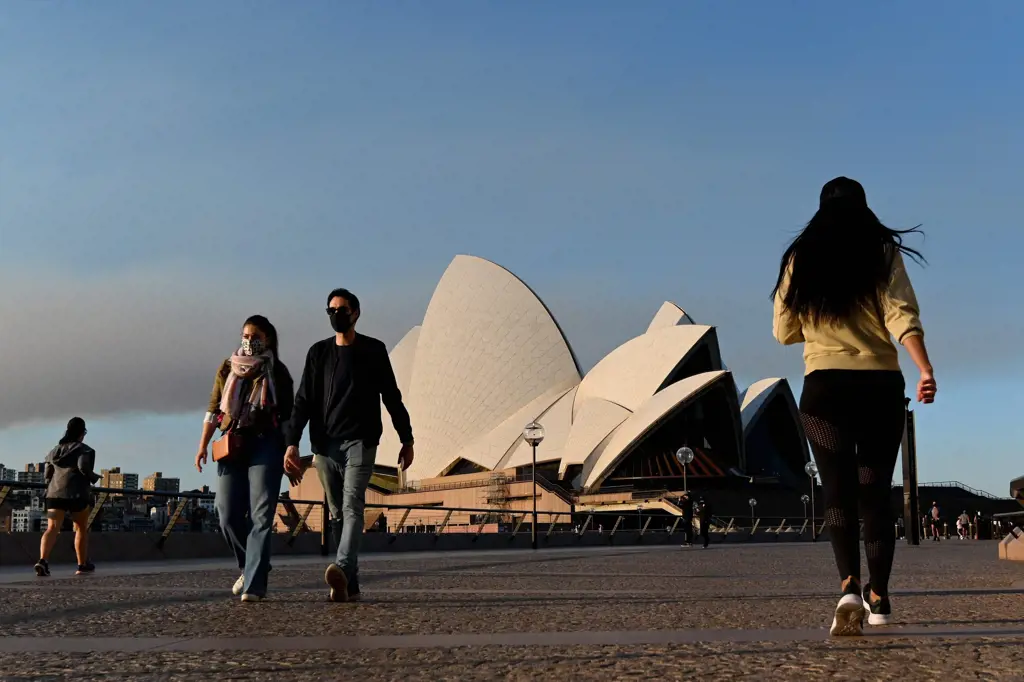
Interstate travel restrictions have become a necessary measure to prevent the spread of COVID-19. In Australia, Sydney has been particularly affected by travel restrictions due to the increase in COVID-19 cases. Traveling from Sydney to other states without a valid reason can lead to penalties.
The penalties for violating interstate travel restrictions vary depending on the state or territory you are visiting. In general, unauthorized travel may result in fines, mandatory quarantine, or being turned away at the border.
For instance, if you travel from Sydney to Victoria without a valid reason, you may face penalties. Victoria has implemented a permit system, known as the Travel Permit System, which requires travelers to apply for a permit before entering the state. Failure to obtain a permit or providing false information can result in fines of up to $5,000 for individuals and $20,000 for businesses. Additionally, travelers may be required to quarantine for 14 days at their own expense.
Similarly, in Queensland, those who travel from Sydney without a valid reason will face penalties. Queensland has a border declaration pass system, which requires travelers to complete a border declaration pass before entering the state. Failure to complete the pass or providing false information can result in fines of up to $4,000 for individuals and $20,000 for businesses. Additionally, travelers may be denied entry or be required to quarantine for 14 days at their own expense.
In Western Australia, unauthorized travel from Sydney can lead to penalties as well. Western Australia has a hard border closure in place, meaning that travelers from Sydney are generally not allowed entry unless they have an exemption. Failure to comply with the restrictions can result in fines of up to $50,000 for individuals and $250,000 for businesses.
It is important to note that these penalties are subject to change, and it is recommended to check the specific restrictions and requirements of each state or territory before planning any interstate travel. Travelers should ensure they have a valid reason for traveling and comply with all the necessary permits, declarations, and quarantine requirements to avoid facing penalties.
In conclusion, violating interstate travel restrictions from Sydney can result in penalties such as fines, mandatory quarantine, or being denied entry. Each state or territory has its own specific requirements and penalties, so it is crucial to stay updated on the latest restrictions and comply with them to ensure a safe and smooth journey.
Understanding EASA Travel Restrictions: What You Need to Know
You may want to see also
Frequently asked questions
No, currently there are travel restrictions in place for Sydney residents who are unable to travel to other states in Australia. These restrictions have been put in place to help prevent the spread of COVID-19 and to protect the health and safety of the community.
Yes, there are exemptions to the interstate travel restrictions for Sydney residents. These exemptions may include essential workers, people traveling for compassionate reasons, or individuals who require medical treatment. It is important to check with the relevant state government or health department for up-to-date information on travel exemptions.
The penalties for breaching the interstate travel restrictions in Sydney vary depending on the state or territory you are traveling to. Some states may impose fines or legal consequences for those who do not comply with the travel restrictions. It is important to familiarize yourself with the specific guidelines and regulations set forth by the state or territory you plan to travel to, as well as any potential penalties for non-compliance.



